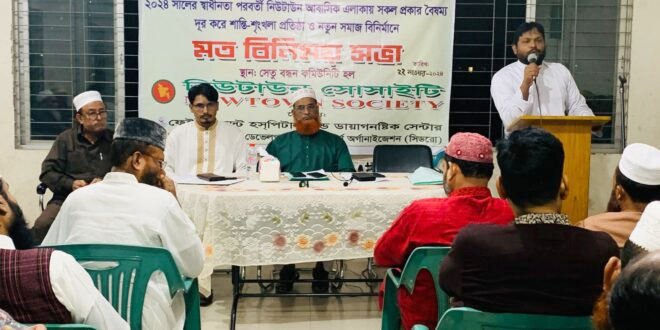
Special Correspondent: Democracy becomes truly meaningful only when people get the opportunity to elect their representatives freely, fearlessly, and impartially. Throughout its history of political unrest, repression, and authoritarian rule, Bangladesh has repeatedly faced the grim reality of being deprived of this fundamental right. However, the Representative Council election of Newtown Society, held in March 2025, has emerged as a shining beacon in that dark history. The active participation of nearly two thousand voters, a fair ballot process, and post-election satisfaction have marked the beginning of a new chapter in grassroots democratic practice.
The birth of Newtown Society took place in the backdrop of severe political turmoil in Dhaka. It is a completely non-political, voluntary social organization, established with the aim of building a foundation of discipline, harmony, and cooperation in society. On August 5, 2024, following the student–public uprising, Prime Minister Sheikh Hasina fled the country, creating a vacuum in state governance. For four consecutive days, Bangladesh was practically without administration; law and order collapsed, and robbery, extortion, and violence made public life unbearable. In this situation, a group of conscious residents of Newtown—Islami Bank officials Md. Motashim Billah and Md. Abu Zafar, Daily Kaler Kotha editor Khwaja Masum Bellah Kausarey, and another Islami Bank officer Md. Jasim Uddin Sikder—met on the night of August 7 to discuss ways to tackle the crisis. In that very meeting, the decision to establish “Newtown Society” was taken. The core goal was to build a transparent, non-political, and welfare-driven platform to free the local people from the curse of political violence and corruption, and to create an integrated social structure.
The Representative Council election held on March 1, 2025, was the first major democratic exercise of the society. The participation of nearly two thousand voters demonstrated how conscious and eager the local community was. Through a ballot-based voting system, voters were able to express their opinions without fear. The election was conducted under the leadership of Chief Election Commissioner Nesar Uddin Ahmed and Commissioners Md. Jalal Ahmed Hawlader, Md. Motashim Billah, Advocate Nuruzzaman, and Secretary Md. Abu Zafar. Members of the management committee—such as Khwaja Masum Bellah Kausarey, Dr. Delwar Jahan Imran, and Md. Jasim Uddin Sikder—played a crucial role in creating an environment of integrity and dedication for a fair election.
No incidents of violence, undue influence, or administrative bias were reported in this election. Voters stood in queues and cast their votes in a festive atmosphere. The presence of election observers, journalists, and human rights activists further enhanced the credibility of the process. Thus, the Newtown Society election proved that if there is a neutral commission, fair management, and an effective law-and-order mechanism, people themselves can enjoy the beauty of democracy.
In Bangladesh’s political reality, elections are often questioned due to vote rigging, administrative bias, or interference by powerful groups. Against such a backdrop, the Newtown Society election has emerged as a model at the local level. Here, voters made decisions based on the candidates’ competence, honesty, and leadership qualities rather than on mere promises. The non-political framework of the society has proven that political banners are not necessary for social development and good governance. People who had lived under fear and terrorism for so long regained confidence and trust through this election.
A total of 340 road representatives were elected through voting, who will serve the people for the next three years. They face several important challenges ahead. First, curbing drugs and terrorism to protect the youth is a priority. Second, eliminating extortion to restore social peace and economic relief is essential. At the same time, infrastructural development—such as drainage, roads, electricity, and drinking water—must be prioritized. Local initiatives to control commodity prices and ensuring social harmony by tolerantly embracing diverse opinions will also be part of their greater responsibility. The future success of this election will depend on their honesty and efficiency—whether it truly becomes a democratic achievement or remains a mere formality.
The Newtown Society election has sent a powerful message at both national and local levels: if people are given confidence, they are ready to participate actively in democracy. This experience may also serve as a model for future cooperative bodies, union councils, or municipal elections.
Finally, this election has reminded us that democracy is not a gift from rulers; it is the right of the people. If people are willing and the right structure is built, democracy can be preserved and established. The Representative Council election of Newtown Society was not merely an act of voting; it was a reflection of transparency, accountability, and public trust at the grassroots level. After long years of political unrest and repression, this election has proved that people themselves are capable of determining their own destiny. Now it is the duty of the elected representatives to prove themselves through action rather than words. If they work with honesty, dedication, and responsibility, then Newtown Society will not just remain a residential organization—it will emerge as a genuine democratic institution and a model for the nation.





